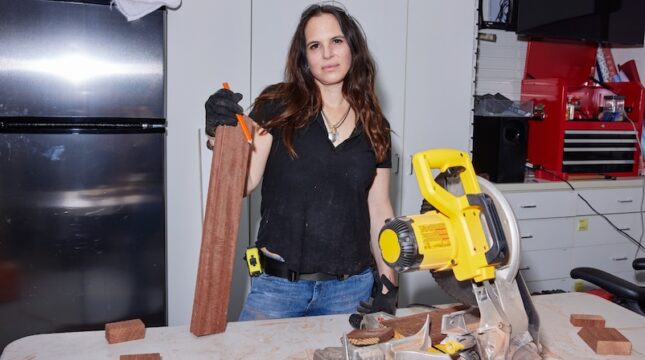How to get a handyman license in Nevada
You don’t need a license to work as a handyman in Nevada. However, if you plan to take on projects that require a building license or have a value of $1,000 or more (including labor and materials), you must have a Nevada general contractor license issued by the Nevada State Contractors Board.
There are three license classification options available:
Class A
General engineering contractor, which requires specialized engineering knowledge and skills
Class B
General building contractor, which involves the construction or remodeling of buildings
Class C
Specialty contractors, which involve specialized building trades of crafts (such as plumbing and heating, electrical, carpentry, roofing and siding, etc.)
Choose the classification that most accurately describes the type of work you plan to do as a handyperson.
Keep in mind that you must obtain a Nevada Business ID from the Nevada Secretary of State Business Portal before completing the application.
If you need assistance in completing your application, the Nevada State Contractors Board offers three options:
- Contact a license analyst by phone.
- Attend a free business assistance program in person or via Zoom.
- Watch a prerecorded business assistance program video online.
Upon approval of your application, you’ll receive a letter from the Board with details about how to sign up for two licensing exams: a trade exam and a business and law exam.
You must pass both exams in order to get your license. You can take the exams at testing centers in Las Vegas, Reno or Elko.
Once you pass your exams, you must pay a $600 fee to get your two-year license.
Nevada contractor license requirements
When submitting your contractor license application to the Nevada State Contractors Board, you must include the following:
Work experience documentation
Your work experience documentation should show that you have at least four years of experience as a journeyman, foreman, supervising employee or contractor. If you have relevant training from a college, university or other program accepted by the Board, you may use that to satisfy up to three years of the work experience requirement.
Financial statement
The exact requirements of your financial statement depend on your requested monetary limit (the maximum contract amount you may take on from a single client) for your business. In most cases, an independent certified public accountant must prepare the statement for you.
You must also include a:
- Resume with all current and past employment
- Background disclosure statement and fingerprint background waiver
- Copy of your driver’s license or government-issued ID
- Check or money order for the $300 application fee
Requirements for Nevada contractor license renewals
You must renew your Nevada contractor license every two years on the last day of the month in which it was issued. A $600 license fee applies each time you renew.
Nevada contractor license reciprocity
Nevada does not maintain reciprocity agreements with other states. However, if you already possess a contractor license in a state the Board deems to have substantially equivalent requirements, you may be eligible for an exam waiver or experience requirement waiver.
In order to qualify, you must have held an active license in the endorsed state for the past four years with no history of disciplinary actions, suspensions or sanctions.
Bond requirements for Nevada contractor licenses
You must obtain a surety bond or submit a cash deposit to obtain your Nevada contractor license. The bond amount varies from $1,000 to $500,000 based on various factors, including your monetary limit, financial statement details and license type.
The Board will notify you after your application’s approval to inform you of the required bond amount for your license.
What kind of insurance does a handyman need in Nevada?
The right Nevada business insurance can help protect your handyperson business regardless of whether your work requires a license. The following list includes the several types of handyman insurance and what they can help cover.
Workers’ Compensation insurance
Nevada workers’ compensation insurance can help cover lost wages, medical expenses and more if injuries occur on the job. In Nevada, you must have workers’ comp coverage if you have employees.
General Liability insurance
As a handyman, your client may ask for proof of general liability insurance. This can help provide coverage for accidents, property damage and other incidents involving a third party.
Tools and Equipment insurance
Tools and equipment insurance can help provide repair and replacement coverage for damaged or stolen work gear.
Commercial Auto insurance
If you drive for work, commercial auto insurance can help cover costs related to accidents, such as medical expenses and property damage.
Commercial Property insurance
Commercial property insurance can help provide coverage for damage or vandalism to a property that you own or rent. Coverage may extend to inventory and equipment you keep in that location.
What is the certificate of insurance requirement in Nevada for handymen?
To get a contractor license, you must have a certificate of insurance to show proof of workers’ compensation coverage. However, you may submit an affidavit for an exemption if you do not have any employees.
How NEXT supports Nevada handypeople
NEXT Insurance helps you get the right small business or self-employed handyman insurance to protect your business and satisfy Nevada licensing requirements.
Using our online services, you can apply for insurance and get a certificate of insurance in just minutes from any computer or mobile device. You can customize your coverage to meet your unique needs and share unlimited COIs at no extra cost.
If you’re ready to get started, get an instant quote today.
Do you have maintenance and repair projects in an area outside Nevada? Learn what states require handyman licenses in our summary of handyman license requirements.
This information has been provided as a service. It is correct and up-to-date to the best of our knowledge; however, it is in no way intended to offer legal advice and you must always consult with local authorities before you make any business decisions. Regulations and requirements may change at any time.







